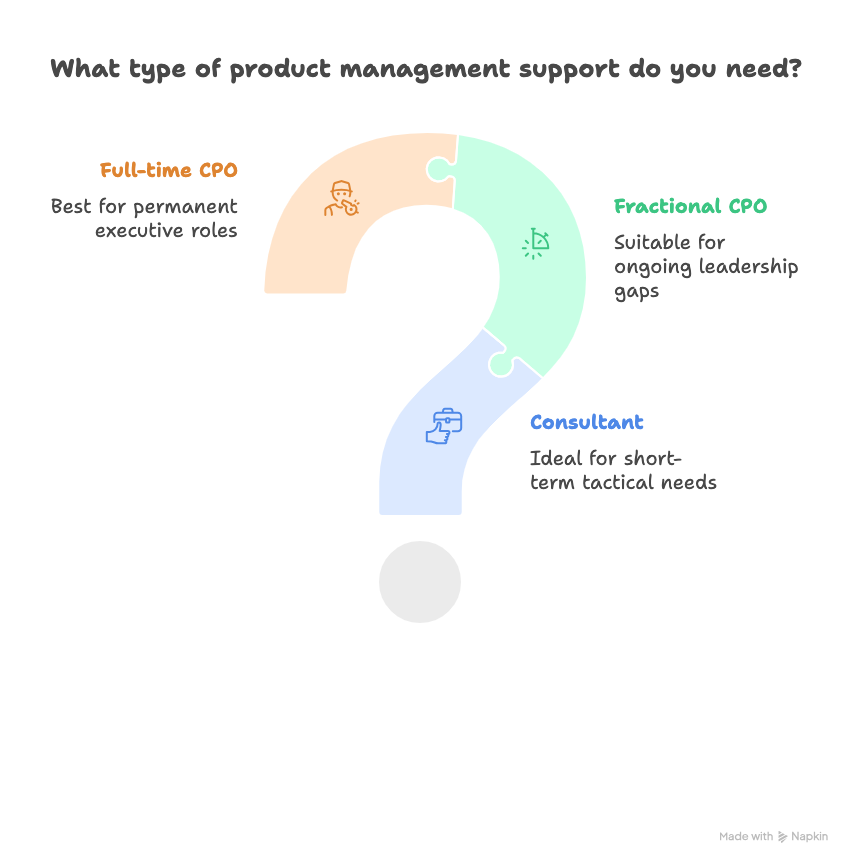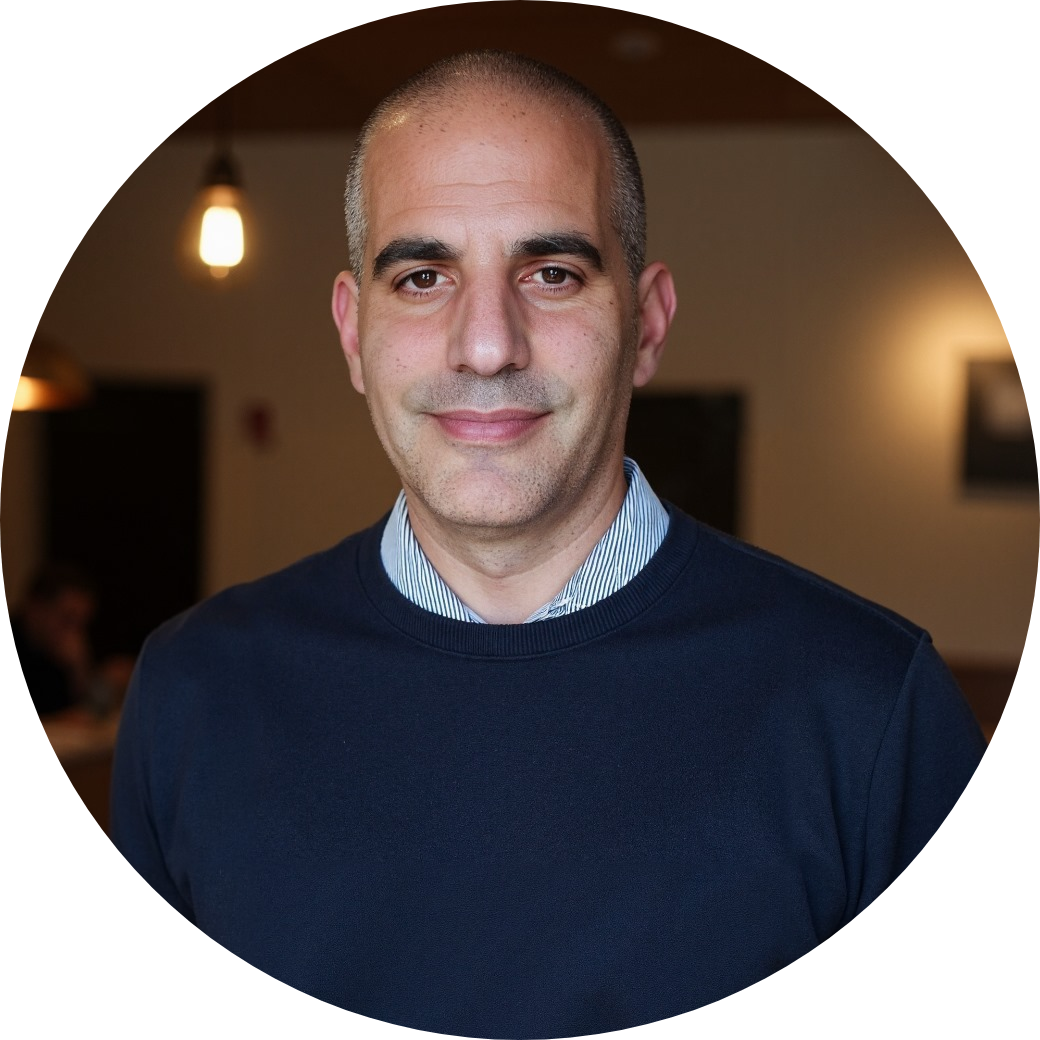What is a Product Consultant? A Complete Guide for SaaS Founders
September 23, 2025 • 6 min read

Last Updated on November 30, 2025 by Sivan Kadosh
Scaling a SaaS company often feels like solving a puzzle where some of the pieces are missing. You know you need help, but you are not sure if you should bring in a consultant, a coach, a fractional executive, or make a full-time hire. One role that frequently comes up in this conversation is the product consultant.
This article breaks down what a product consultant actually does, how they differ from fractional CPOs and full-time product leaders, what they cost, and when they make sense for a growing SaaS company. By the end, you will have the clarity to decide whether a consultant is the right fit or if your business needs longer-term product leadership.
Key takeaways:
- A product consultant provides short-term, specialized expertise for product challenges like market research, prototyping, or roadmapping.
- Consultants are best for targeted projects, not ongoing leadership or organizational transformation.
- Costs vary, but most consultants charge hourly, daily, or project-based fees.
- Growth-stage SaaS companies often outgrow consultants and benefit more from fractional CPOs who provide ongoing executive-level guidance.
What does a product consultant do?
A product consultant is typically a former or current product leader who offers specialized expertise on a temporary basis. They are often brought in to solve specific problems or provide an objective outside perspective.
Common responsibilities of a product consultant include:
- Conducting market and user research.
- Defining product strategy and vision.
- Building or refining product roadmaps.
- Prototyping and validating concepts.
- Facilitating stakeholder alignment.
- Advising on go-to-market strategies.
In essence, a product consultant plugs into your team for a set period of time to help answer tough product questions or move a project forward.
Product consultant vs fractional CPO vs full-time hire
This is where confusion often arises. While consultants, fractional CPOs, and full-time product leaders all contribute to product success, they do so in very different ways.
Stop guessing. Start calculating.
Access our suite of calculators designed to help SaaS companies make data-driven decisions.
Free tool. No signup required.
Here is a quick comparison table to help you understand these roles:
| Role | Scope of work | Time commitment | Strategic depth | Best for |
| Product consultant | Short-term, project-based expertise | Weeks to months | Tactical to strategic | Filling skill gaps, research, prototyping |
| Fractional CPO | Ongoing executive leadership without full-time cost | Part-time, long-term | High, across product and business alignment | Scaling product strategy and org structure |
| Full-Time CPO | Permanent executive leadership | Full-time, permanent | High, full ownership | Large or late-stage companies needing constant leadership |
Takeaway: Consultants solve immediate problems, while fractional CPOs and full-time leaders provide the long-term product vision and execution needed to scale.
Engagement models and costs of product consultants
Consultants usually price their services in one of three ways:
- Hourly: $100–$300+ per hour depending on seniority and specialization.
- Daily/Weekly: $1,000–$3,000 per day, often bundled into short sprints.
- Project-based: Fixed fees for defined deliverables like a research study, roadmap, or prototype.
Fractional CPOs, on the other hand, often work on a monthly retainer, offering consistent leadership for less than the cost of a full-time executive.
When to hire a product consultant (and when not to)
Good reasons to bring in a consultant:
- You need short-term research before a funding round or pivot.
- You want an unbiased view of your roadmap.
- Your team lacks expertise in a specific area, like UX research or go-to-market planning.
- You are validating early product-market fit.
Situations where a consultant is not enough:
- You need ongoing executive-level leadership.
- You are scaling a product team and need organizational structure.
- You want to align product and business strategy over the long term.
- You are experiencing churn or retention issues that require systemic change.
From my experience: the high cost of choosing the wrong type of help
A good friend of mine, the CEO of a fast-growing B2B SaaS company, faced this exact dilemma. His company had a solid product with an ARR of $3M, but the monthly customer churn rate had silently climbed to a dangerous 4%. He did what many smart founders do: he hired a brilliant, high-end UX consulting firm for a $30,000 project fee.
After six weeks of intensive work, the consultants delivered a masterful strategic report. It was full of incredible insights and a clear path to fix the user onboarding flow. The team was thrilled. They thought the problem was solved.
Six months later, my friend called me, frustrated. I asked him a simple question: “How much of that report have you implemented?” The answer was a painful “maybe 10%.” The brilliant report was collecting dust.
Why? Because his dev team was already buried in their existing roadmap. After the consultants left, there was no senior leader with the singular focus to own the execution. No one to fight for the project’s priority in leadership meetings. The consultants’ job was to deliver a report, and they did it perfectly. But what the company actually needed was ongoing leadership.
The true cost wasn’t the $30,000 fee. The true cost was the six critical months they lost. During that time, their 4% monthly churn compounded, resulting in a loss of over $600,000 in Annual Recurring Revenue. It was a very expensive lesson in the difference between short-term advice and long-term leadership.
This is the critical difference. A consultant provides a map. A Fractional CPO not only helps draw the map but also takes the wheel to ensure you reach your destination.
Product management consulting checklist:
- Is this a short-term tactical need? → Consultant
- Is this an ongoing leadership gap? → Fractional CPO
- Do we need a permanent executive? → Full-time CPO

Product consultant vs product coach: what’s the difference?
While often confused, consultants and coaches serve different purposes:
| Role | Focus | Relationship | Example |
| Product consultant | Solves product challenges, delivers outcomes | Short-term, project-based | Builds roadmap, validates market research |
| Product coach | Develops skills of product leaders and teams | Long-term, mentoring | Trains product managers on prioritization frameworks |
For SaaS founders, this distinction matters. A consultant helps with your product, while a coach develops your people.
Alternatives to hiring a product consultant
If a consultant does not feel like the right fit, consider:
- In-house training: Skill up your team for long-term resilience.
- Online courses and certifications: Build product management expertise internally.
- Networking and peer groups: Leverage SaaS communities for advice and best practices.
- Hire a fractional CPO: For growth-stage SaaS companies needing ongoing leadership, this often provides the highest ROI.
How to choose the right product consultant
When evaluating consultants, look for:
- Proven SaaS experience: Have they worked with companies like yours?
- Specialization: Do they align with your exact need (UX, strategy, go-to-market)?
- Communication and cultural fit: Will your team trust and collaborate with them?
- References and case studies: Can they show measurable outcomes from past projects?
- Budget alignment: Do their fees match your expectations and stage?
Conclusion: should you hire a product consultant or a fractional CPO?
Product consultants bring valuable expertise when you have a short-term challenge or a knowledge gap to fill. But if your SaaS company is scaling, facing churn, or struggling to align product with business outcomes, you likely need more than a consultant. That is where a fractional CPO makes the difference, providing ongoing executive-level leadership without the cost of a full-time hire.
If you are past the point of short-term fixes and want lasting alignment between your product strategy and business outcomes, a fractional CPO can definitely help. Our fractional CPO services are designed for growth-stage SaaS companies just like yours.
FAQs
What does a product consultant do?
They provide short-term, specialized expertise to help companies with product challenges like research, strategy, or prototyping.
How much does a product consultant cost?
Rates vary widely, but most charge between $100–$300 per hour or $1,000–$3,000 per day. Project fees are also common.
What’s the difference between a product consultant and a product manager?
A product manager is a permanent team member responsible for ongoing product execution. A consultant is external and focused on short-term projects.
Product consultant vs fractional CPO: which is better?
It depends on your needs. Consultants are best for short projects, while fractional CPOs provide ongoing leadership to scale your product and team.
How long does a consultant engagement typically last?
Anywhere from a few weeks to a few months, depending on the scope.

Sivan Kadosh is a veteran Chief Product Officer (CPO) and CEO with a distinguished 18-year career in the tech industry. His expertise lies in driving product strategy from vision to execution, having launched multiple industry-disrupting SaaS platforms that have generated hundreds of millions in revenue. Complementing his product leadership, Sivan’s experience as a CEO involved leading companies of up to 300 employees, navigating post-acquisition transitions, and consistently achieving key business goals. He now shares his dual expertise in product and business leadership to help SaaS companies scale effectively.